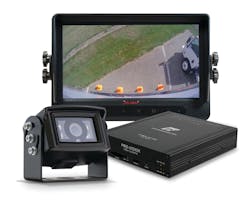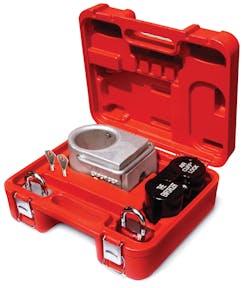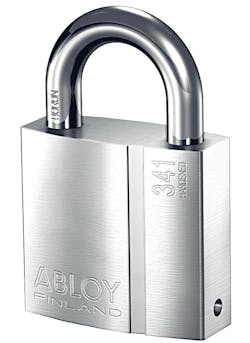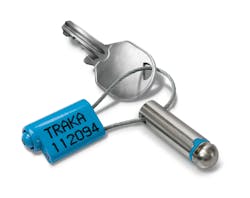The need for high-tech, high-security cargo protection continues to increase as thieves get smarter and trucking supply chains become more vital. It’s no longer just about making sure cargo is safely locked in a trailer. Now, emerging technologies are ensuring that fleets can actually see that cargo and know it’s secure.
From shingle and copper thefts off utility trucks to armored truck threats, Andrew Beach, director of sales at Pro-Vision Video Systems, has seen it all. His company focuses on making sure fleet managers can see their loads in real-time and create video recordings of theft or damage to cargo.
Pro-Vision can create a mobile surveillance system that tracks and records anything happening inside and outside of the vehicle, whether it’s moving or parked, Beach told FleetOwner. “I would want to be able to record as soon as I start the vehicle up and every second that the vehicle is going down the road,” he said. “Just in case I’m in an accident or somebody targets my vehicle, I need to be able to again defend the fleet.”
According to FBI data, less than one-quarter of the $33 million in cargo theft reported in 2018 was recovered based on 649 incidents that year. Nearly half of the reported cargo theft incidents were at truck and business parking lots, drop lots, and garages.
While the average cargo theft in the U.S. is valued at more than $50,000, it can cost fleets up to four times the value of the products stolen, according to SensiTech, a supply chain visibility company. Along with the loss of cargo, equipment, and driver time, fleets that are self-insured may have to cover the theft costs, and fleets with more traditional insurance can face rising premiums.
Thieves in the U.S. and Canada most frequently prey upon unattended cargo trucks parked in unsecured locations, including truck stops and gas stations, according to 2019 data gathered by Scottsdale, Ariz.-based BSI and its Supply Chain Risk Exposure Evaluation Network, known as SCREEN. The firm breaks down cargo data by continent, but cargo thefts south of the border in Mexico involve more hijackings than what is seen in the U.S. and Canada.
A lack of secure parking combined with hours of service rules that limit driving time in these two countries is what makes cargo most vulnerable, according to BSI’s 2020 Cargo Theft Report, which it publishes annually with the TT Club, an international transport and logistics insurer.
While most cargo theft (66%) in North America is reported in Mexico, thieves throughout the continent are focused on the same goods, with nearly one-third of thefts involving food and beverage. Other popular cargo for criminals to target is electronics (13%), consumer products (12%), alcohol and tobacco (7%), and construction materials (5%).
Drivers have to stop and leave their loads unattended at some point on their routes, Beach noted. This is why constant surveillance is a big selling point for vendors such as Pro-Vision, which uses motion-detection and night-vision technologies to capture events and alert fleet managers of potential harm to their cargo.
“We’re capturing all the footage when the driver steps away,” he said. “That’s truly a surveillance solution at that point.”
Asset tracking
Ontario-based XTL Transport, which runs 400 tractors throughout Canada, was the victim of cargo theft in the Montreal area. “The trailer itself costs $50,000, and the value of its contents are significantly more,” fleet director Aslan Motahedin said. “At one point, we were hit with two thefts within two weeks; one was a total loss, and the other was only partially recovered. It was what made us realize something needed to change.”
The fleet turned to Canadian technology provider BlackBerry and its Radar trailer tracking solution. The tracking devices feature multiple sensor readings that remotely show the trailer’s location, mileage, and door status. Radar devices can also communicate with additional wireless sensors to increase visibility. The GPS trackers are powered by a self-contained battery that doesn’t need charging and can operate even if the trailer isn’t connected to the tractor.
Fleets with BlackBerry Radar can set up geofencing alerts to make sure trailers are where they are supposed to be. “Every time a trailer leaves, we get an exit alert, and an automated process checks our transport management system to see if the trailer in question is currently dispatched,” Motahedin explained.
If a trailer was not dispatched but is on the move, an automated process checks the location and status of nearby tractors for a possible match. If no match is found, the fleet’s operations center is alerted by email. BlackBerry Radar also comes with an online dashboard featuring analytics and insights that can be customized for a fleet.
The lock
Jerry Burhans, managing director of Abloy USA, an advanced locking and access-management solutions company, suggests fleets use a “layered approach to their cargo security, starting with implementing company-wide processes, driver education and procedural controls around locks and keys to mitigate risks.”
The first defense for an unmanned trailer can be a simple padlock. But padlocks don’t have to be simple. Some locks are made to mimic the complexities of a bank vault. As cargo theft risks have grown in recent years, so has the technology that goes into a typical trailer lock.
Abloy partner Transport Security Inc. (TSI) has helped the freight industry secure loads for more than 40 years. TSI’s Enforcer lock uses a series of disc tumblers that function like bank vault locks, making it difficult for a thief looking for a quick score.
TSI maintains the key codes for future key replacement and can set up a system for keyed alike or master keyed systems. The padlocks also utilize a unique rotating disc cylinder that is effectively pick-proof, according to Keith Astrup, TSI president.
TSI incorporates all of the Abloy USA padlocks and cylinders into its products for trailer and truck security solutions, explained Nick Erdmann, director of sales at TSI. “Our customers like the durability of their padlocks and cylinders, along with the ease of use and not having to replace locks due to malfunctioning,” he said.
TSI also sells the Portable Locking Security Kit for fleets and owner-operators to secure over-the-road tractors and trailers. The kit’s rugged, lightweight case holds a kingpin lock, air cuff locks to secure air valve levers and to prevent brake release, and two high-security Abloy PL 341/25 padlocks for trailer doors.
But large fleets with many drivers can make managing the keys and locks complicated, Burhans pointed out.
“When you’re employing security hardware to protect thousands of vehicles that transport goods, you’re also bound to lose or misplace keys or vehicles, and that can add up to millions annually,” he said. “People are going to lose keys, period.”
To combat this problem, Abloy’s sister company, Traka fleet solutions, recently introduced a high-tech “intelligent” key that works with trucks, vans, commercial equipment, or other high-value assets that must be managed.
Traka’s iFob key management solution features a durable, nickel-plated brass device with a unique electronic ID. When secured to a key set, it enables those keys to be locked in the S-Series Touch key cabinet and only released to authorized users.
With every key uniquely identified to the system, administrators can see who has which key and when that individual received the key. Administrators can also set access schedules and receive alerts should a key be overdue. The Traka administration software includes features such as mileage and fuel-level logging when keys are returned. It can also document precisely where the vehicle was parked to help the next driver find that vehicle easily in a lot.
If a vehicle is faulty, an authorized user can notify management when putting their key back into the cabinet. Traka’s system can prevent others from accessing the vehicle until a repair is carried out and the fault cleared.
Insurance
Implementing hardware and software cargo-theft technologies can not only help secure freight from theft and cut losses, but it can help reduce insurance rates, Pro-Visions’ Beach noted.
“If I’m going to be smart about implementing camera technology and theft is my main concern, I probably want to have a conversation with my insurance provider to make sure I can save on premiums,” he said, adding that the cameras need to do more than just record suspicious activity.
What good is the recording if fleets can’t access them quickly?
“If you’re a fleet manager in Topeka and the theft happened in Denver, being able to transfer video remotely to the local law enforcement agency—and to your insurance adjuster—is a must,” Beach said. “If the software doesn’t do that, it’s probably not the most friendly software. You can’t afford to lose that time.”
About the Author
Josh Fisher
Editor-in-Chief
Editor-in-Chief Josh Fisher has been with FleetOwner since 2017. He covers everything from modern fleet management to operational efficiency, artificial intelligence, autonomous trucking, alternative fuels and powertrains, regulations, and emerging transportation technology. Based in Maryland, he writes the Lane Shift Ahead column about the changing North American transportation landscape.





